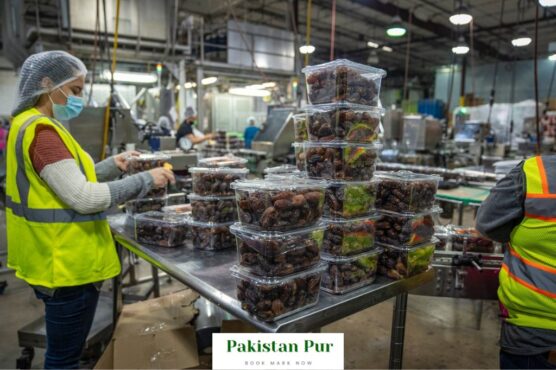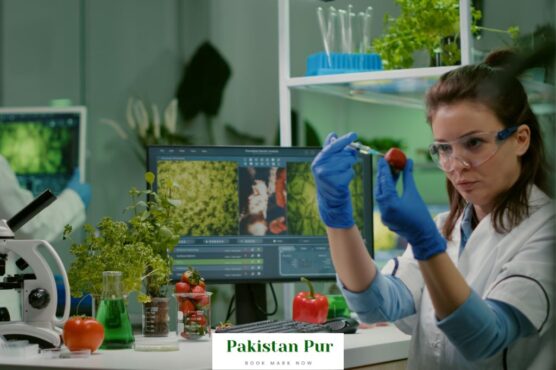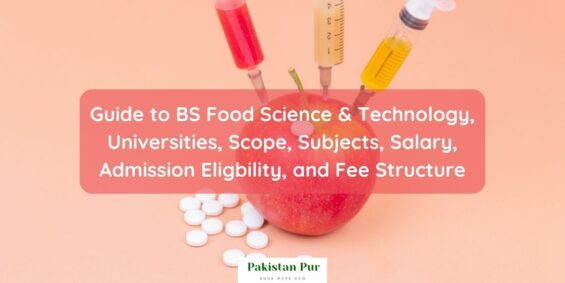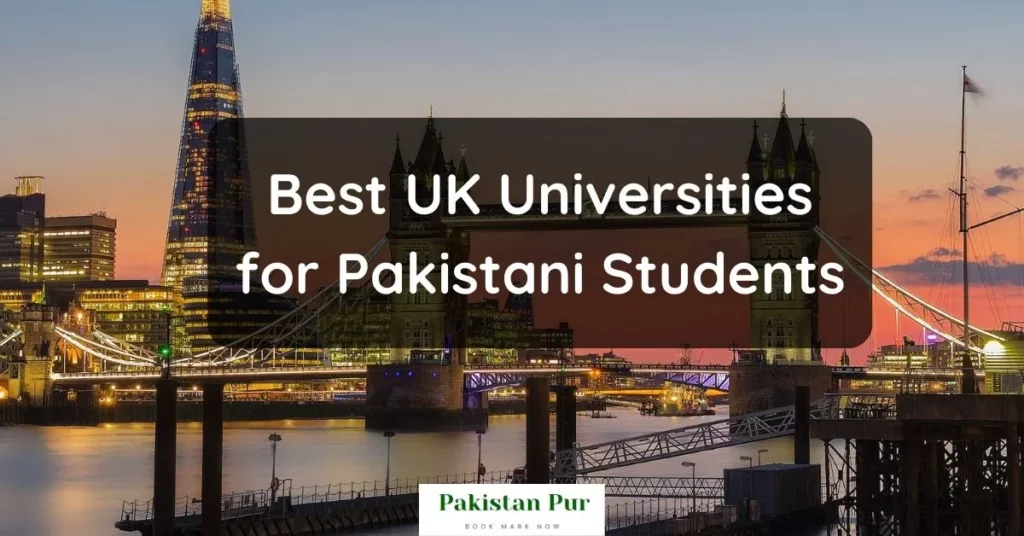Table of Contents
In Pakistan, the BS Food Science and Technology program is gaining popularity due to its promising career prospects.
The bs food science and technology program offers students the opportunity to work in food processing industries, educational institutions, research organizations, and government agencies.
With a focus on providing knowledge and hands-on training in the foundational courses of food science, students learn about sensory evaluation techniques, novel functional foods, and current food laws.
The BS food science and technology scope in Pakistan is expanding, with a multidisciplinary approach that incorporates chemistry, biochemistry, nutrition, microbiology, and engineering. Several universities in Pakistan offer this program, making it accessible to aspiring students.
In this article, we will discuss:
- BS Food Science and Technology Universities in Pakistan
- BS Food Science And Technology Scope In Pakistan
- BS Food Science And Technology Eligibility For Admission
- BS Food Science And Technology Subjects And Syllabus
- BS Food Science And Technology Fee Structure In Top Universities
This Ultimate Guide to BS Food Science and Technology is a part of the series on the best degrees after FSc Pre Medical. Read our blog here.
Best Degrees after FSc Pre Medical in Pakistan
BS Food Science and Technology Universities in Pakistan
These are the colleges and universities offering BS Food Science and Technology in Pakistan. Use the search function to find a university in your city.
| Institution | City | Program | Public/Private |
|---|---|---|---|
| Abbottabad University Of Science And Technology | Abbottabad | BS , 4 Years | Public |
| Cholistan University Of Veterinary & Animal Sciences | Bahawal Pur | BS , 4 Years | Public |
| The Government Sadiq College Women University | Bahawal Pur | BS , 4 Years | Public |
| The Islamia University Of Bahawalpur | Bahawal Pur | BS , 4 Years | Public |
| Ghazi University | Dera Ghazi Khan | B.Sc. (Hons) , 4 Years | Public |
| Gomal University | Dera Ismail Khan | BS , 4 Years | Public |
| Government College University | Faisalabad | AD , 2 Years | Public |
| Government College University | Faisalabad | BS , 4 Years | Public |
| Government College Women University | Faisalabad | BS , 4 Years | Public |
| University Of Agriculture | Faisalabad | B.Sc. (Hons) , 4 Years | Public |
| Karakuram International University | Gilgit | BS , 4 Years | Public |
| University Of Haripur | Haripur | BS , 4 Years | Public |
| Sindh Madressatul Islam University | Karachi | BS , 4 Years | Public |
| University Of Karachi | Karachi | BS , 4 Years | Public |
| University Of The Punjab | Lahore | BS , 4 Years | Public |
| University Of Veterinary And Animal Sciences | Lahore | BS , 4 Years | Public |
| Hazara University | Mansehra | BS , 4 Years | Public |
| Abdul Wali Khan University, Mardan | Mardan | BS , 4 Years | Public |
| Bahauddin Zakariya University, Multan | Multan | B.Sc. (Hons) , 4 Years | Public |
| Nfc Institute Of Engineering & Technology | Multan | BS , 4 Years | Public |
| University Of Narowal | Narowal | BS , 4 Years | Public |
| University Of Okara | Okara | BS , 4 Years | Public |
| Khawaja Fareed University Of Engineering & Information Technology | Rahim Yar Khan | BS , 4 Years | Public |
| Pir Mahar Ali Shah Arid Agriculture University | Rawalpindi | BS , 4 Years | Public |
| Shaheed Benazir Bhutto International University Of Veterinary And Animal Sciences | Sakrand | BS , 4 Years | Public |
| University Of Sargodha | Sargodha | BS , 4 Years | Public |
| University Of Sialkot | Sialkot | BS , 4 Years | Private |
| Dadabhoy Institute Of Higher Education | Karachi | BS , 4 Years | Private |
| Hamdard University | Karachi | BS , 4 Years | Private |
| Jinnah University For Women | Karachi | BS , 4 Years | Private |
| Sir Syed University Of Engineering & Technology | Karachi | BS , 4 Years | Private |
| Sohail University | Karachi | BS , 4 Years | Private |
| Zia-ud-din Medical University | Karachi | BS , 4 Years | Private |
| Minhaj University | Lahore | BS , 4 Years | Private |
| Nur International University | Lahore | BS , 4 Years | Private |
| The University Of Lahore ( Main Campus ) | Lahore | BS , 4 Years | Private |
| University Of Central Punjab | Lahore | BS , 4 Years | Private |
| University Of Management And Technology | Lahore | BS (HONS) , 4 Years | Private |
| Grand Asian University Sialkot | Sialkot | AD , 2 Years | Private |
| Grand Asian University Sialkot | Sialkot | BS , 4 Years | Private |
| University Of Agriculture Faisalabad, Sub Campus | Burewala | BS , 4 Years | Public |
| University Of Agriculture Faisalabad(Sub Campus) | Depal Pur | BS , 4 Years | Public |
| University Of Sargodha (Lyallpur Campus) | Faisalabad | BS , 4 Years | Public |
| Universtiy Of Engineering And Technology (Sub Campus) | Kala Shah Kaku | BS , 4 Years | Public |
| Government College University Faisalabad (Layyah Campus) | Layyah | BS , 4 Years | Public |
| Government College University Faisalabad (Layyah Campus) | Layyah | AD , 2 Years | Public |
| Government College University Faisalabad, Sahiwal Campus | Sahiwal | AD , 2 Years | Public |
| Government College University Faisalabad, Sahiwal Campus | Sahiwal | BS , 4 Years | Public |
| The University Of Agriculture, Swat Campus | Swat | B.Sc. (Hons) , 4 Years | Public |
| Riphah International University, Faisalabad Campus | Faisalabad | BS , 4 Years | Private |
| Hamdard University – Islamabad Campus | Islamabad | BS , 4 Years | Private |
| Riphah International University Lahore | Lahore | BS , 4 Years | Private |
| Khairpur College Of Agricultural Engineering And Technology | Khair Pur | BS , 4 Years | Public |
| University Of Home Economics | Lahore | BS , 4 Years | Public |
| Lyallpur Institute Of Advance Studies | Faisalabad | BS , 4 Years | Private |
| Times Institute | Multan | BS , 4 Years | Private |
Understand the scope of BS Food Science and Technology in our guide below and see if it provides stable career.
Scope Of BS Food Science And Technology In Pakistan
BS Food Science and Technology Subjects
BS Food Science and Technology Syllabus HEC
This is the detailed syllabus and the list of subjects for BS food science and technology. You can also download BS Food Science and technology syllabus by HEC.
BS Food Science and Technology Subjects: Semester 1
- Mathematics-I or Biology-I
- Statistics
- Introduction to Information Technology/ Computer
- Pakistan Studies
- English-I
- Essentials of Biochemistry
- Introduction to Food Science & Technology
BS Food Science and Technology Subjects: Semester 2
- Mathematics-II or Biology-II
- Applied Statistics
- Islamic Studies or
- Ethics (For Non-Muslim Students)
- Basic Agriculture
- Horticulture
- General Microbiology
- Principles of Human Nutrition
BS Food Science and Technology Subjects: Semester 3
- Entomology/ Plant Protection
- Plant Pathology
- English-II
- Physics
- Food Chemistry
- Food Processing & Preservation
BS Food Science and Technology Subjects: Semester 4
- Marketing and Agri. Business
- Unit Operation in Food Processing
- Fluid Mechanics
- Fruits and Vegetables Processing
- Food Process Engineering
BS Food Science and Technology Subjects: Semester 5
- Food Safety
- Cereal Technology
- Sugar Technology
- Technology of Fats and Oils
- Instrumental Techniques in Food Analysis
- Beverage Technology
BS Food Science and Technology Subjects: Semester 6
- Community Nutrition
- Food Plant Layout and Sanitation
- Confectionery and Snack Foods
- Bakery Products Technology
- Postharvest Technology
- Food Microbiology
- Food Product Development
BS Food Science and Technology Subjects: Semester 7
- Meat Technology
- Dairy Technology
- Food Laws & Regulations
- Food Biotechnology
- Food Packaging
- Poultry and Egg Processing
- Research Projects and Scientific Writing
BS Food Science and Technology Subjects: Semester 8
- Sensory Evaluation of Foods
- Sea Food Processing Technology
- Extrusion Technology
- Milk and Meat Hygiene and Public Health
- Food Quality Management
- Internship and Report Writing

BS Food Science and Technology Eligibility
To pursue a Bachelor of Science (BS) degree in Food Science and Technology in Pakistan, there are specific eligibility criteria that students need to meet.
Here are the general requirements for admission to BS Food Science and Technology programs in Pakistan:
- Educational Qualification: Applicants must have completed their FSc Pre medical, or intermediate education or an equivalent qualification recognized by the respective university or college.
- Minimum Marks: A minimum of 50% marks in the intermediate examination is typically required for admission to BS Food Science and Technology programs. However, it’s essential to check with individual universities or colleges for their specific admission criteria.
- Subject Background: Students from both Pre-Medical and Pre-Engineering backgrounds are usually eligible to apply for BS Food Science and Technology programs. This means that individuals who have studied subjects like Biology, Chemistry, Physics, and Mathematics can apply for admission.
- No 3rd Division: It is often necessary for applicants to have no 3rd division in their Matriculation (SSC) examination.
- Entrance Test: Some universities or colleges may require applicants to pass an entrance test as part of the admission process. The details of the entrance test will be specified by the respective institution.
It’s important to note that specific eligibility criteria may vary among different universities and colleges offering BS Food Science and Technology programs in Pakistan.
It is recommended to research and consult the official websites or admissions offices of the desired institutions for accurate and up-to-date information regarding eligibility requirements.
Hamdard University Karachi BS Food Science & Technology Eligibility Criteria
To apply for the Bachelor of Science (BS) program in Food Science and Technology at Hamdard University Karachi, you need to meet the following eligibility criteria:
- Educational Qualification: Applicants must have completed their intermediate education or an equivalent qualification recognized by the university.
- Minimum Marks: A minimum of 50% marks in the intermediate examination or DAE (Diploma of Associate Engineering) is required for admission to the BS Food Science and Technology program at Hamdard University Karachi.
- Program Outcomes: Students who successfully complete the program will have satisfied the program outcomes, which include applying knowledge of mathematics and other relevant subjects.
For specific details regarding admission requirements and eligibility criteria, it is recommended to directly contact Hamdard University Karachi or refer to their official website.
BS Food Science & Technology Fee Structure
UVAS Bs Food Science And Technology Fee Structure
- Admission Fee: Rs. 18,820
- Total 1st Semester Fee: Rs. 91,130
- Subsequent Semesters Fee: Rs. 37,430
- Total Degree Fee: Rs. 353,140 (approx)
BS Food Science and Technology in Different Cities
BS Food Science and Technology in Lahore
These are the BS food science and technology universities in Lahore.
- University Of The Punjab
- University Of Veterinary And Animal Sciences
- Minhaj University
- Nur International University
- The University Of Lahore ( Main Campus )
- University Of Central Punjab
- University Of Management And Technology
- Riphah International University Lahore
- University Of Home Economics
BS in Food Science and Technology in Karachi
This is a list of BS food science and technology universities in Karachi.
- Sindh Madressatul Islam University
- University Of Karachi
- Dadabhoy Institute Of Higher Education
- Hamdard University
- Jinnah University For Women
- Sir Syed University Of Engineering & Technology
- Sohail University
- Zia-ud-din Medical University
BS in Food Science and Technology in Islamabad
These univerisities offer BS food science and nutrition in Islamabad.
- Hamdard University – Islamabad Campus
BS in Food Science and Technology in Peshawar
These univerisities offer BS food science and nutrition in Peshawar.
- The University of Agriculture, Peshawar
BS in Food Science and Technology in Multan
These univerisities offer BS food science and nutrition in Multan.
- Bahauddin Zakariya University, Multan
- NFC Institute Of Engineering & Technology
- Times Institute
BS in Food Science and Technology in Faisalabad
These univerisities offer BS food science and nutrition in Faisalabad.
- Government College University
- Government College University
- Government College Women University
- University Of Agriculture
- University Of Sargodha (Lyallpur Campus)
- Riphah International University, Faisalabad Campus
- Lyallpur Institute Of Advance Studies

BS Agriculture Vs Food Science and Technology Pakistan
When considering higher education options in Pakistan, two popular fields of study that often come up are BS Agriculture and BS Food Science and Technology. Both these fields have their own unique characteristics and career prospects. Let’s delve into a detailed comparison between the two:
1. Scope and Focus:
- BS Agriculture: The field of BS Agriculture focuses on the study of farming, crop cultivation, animal husbandry, soil science, plant pathology, and agricultural economics. It covers various aspects of agriculture with the aim of improving crop productivity, sustainable farming practices, and rural development.
- BS Food Science and Technology: On the other hand, BS Food Science and Technology primarily focuses on the scientific understanding and technological advancements related to food processing, safety, preservation, nutrition, quality control, and product development. This field combines elements of biology, chemistry, engineering, and nutrition to ensure the production of safe and nutritious food products.
2. Course Curriculum:
- BS Agriculture: The curriculum for BS Agriculture typically includes subjects such as agronomy, plant breeding and genetics, animal sciences, agricultural economics, horticulture, soil science, and agricultural engineering. Students gain knowledge about crop production, livestock management, farm management, and agricultural policy.
- BS Food Science and Technology: In BS Food Science and Technology, students study subjects like food chemistry, microbiology, food analysis, food engineering, food preservation techniques, sensory evaluation, product development, and food quality management. The curriculum is designed to equip students with the skills necessary to work in the food industry, ensuring food safety, and developing new food products.
3. Career Opportunities:
- BS Agriculture: Graduates in Agriculture can pursue a variety of career paths. They can work in government agricultural departments, research institutions, agribusiness companies, agricultural consulting firms, and NGOs focused on rural development. Career options include agriculture officer, crop consultant, agricultural research scientist, agricultural extension officer, and farm manager.
- BS Food Science and Technology: Graduates in Food Science and Technology have opportunities in food processing companies, quality assurance departments, research and development organizations, regulatory agencies, food testing laboratories, and the food and beverage industry. Career options include food technologist, food safety specialist, product development manager, food quality manager, and food regulatory compliance officer.
Conclusion:
Both BS Agriculture and BS Food Science and Technology offer promising career prospects in Pakistan. Choosing between the two depends on your specific interests and career goals.
If you have a passion for farming, crop management, and animal sciences, BS Agriculture might be a suitable choice. On the other hand, if you are interested in the scientific aspects of food production, preservation, and quality control, BS Food Science and Technology could be the right path for you.
It is essential to thoroughly research the curriculum, career opportunities, and personal interests before making a decision. Consulting with academic advisors or professionals in the respective fields can provide valuable insights to help you make an informed choice.
BS Food Science Vs BS Nutrition
When considering undergraduate programs in the field of food and nutrition, two popular options often come up: BS Food Science and BS Nutrition.
It’s important to understand the similarities and differences between these programs to make an informed decision.
Let’s compare them in terms of their focus, curriculum, and career prospects:
1. Study Focus
- BS Food Science: The BS Food Science program focuses on the scientific understanding of food, including its composition, processing, preservation, and safety. Students learn about food chemistry, microbiology, food analysis, food engineering, and sensory evaluation. The goal is to develop a deep understanding of food production, quality control, and product development.
- BS Nutrition: The BS Nutrition program primarily focuses on the study of human nutrition, dietetics, and health promotion. Students learn about the science of nutrients, dietary guidelines, clinical nutrition, community nutrition, and nutrition counseling. The aim is to educate individuals on the importance of proper nutrition for overall health and well-being.
2. Course Curriculum
- BS Food Science: The curriculum for BS Food Science typically includes subjects such as food chemistry, food microbiology, food processing technology, food quality management, food safety, and food product development. Students also study subjects like nutrition, biology, chemistry, and engineering to gain a comprehensive understanding of food science.
- BS Nutrition: In BS Nutrition, students study subjects like human anatomy and physiology, nutritional biochemistry, medical nutrition therapy, community nutrition, research methods, and public health nutrition. The curriculum focuses on developing knowledge and skills related to assessing nutrition needs, designing and implementing nutrition interventions, and promoting healthy eating habits.
3. Career Opportunities
- BS Food Science: Graduates in Food Science can pursue various career paths, including roles in food processing companies, quality assurance departments, research and development organizations, regulatory agencies, and the food industry. Career options include food technologist, quality control manager, product development specialist, food safety officer, and food analyst.
- BS Nutrition: Graduates in Nutrition have opportunities in healthcare facilities, public health departments, community organizations, research institutions, and the food industry. Career options include clinical dietitian, community nutritionist, research assistant, nutrition educator, public health nutritionist, and corporate wellness consultant.
Conclusion:
Both BS Food Science and BS Nutrition offer promising career prospects in the food and nutrition industry. The choice between the two depends on your specific interests and career goals.
If you are more inclined towards the scientific aspects of food production, quality control, and product development, BS Food Science may be the right choice for you. On the other hand, if you are passionate about promoting health through proper nutrition, BS Nutrition could be a suitable path.
Consider your strengths, interests, and long-term goals when making a decision. It’s also beneficial to research the curriculum, and career opportunities, and speak with professionals in the field to gain insights that will help you make an informed choice.
FAQs
Can I Do MS Food Science After BS Chemistry?
Yes, it is possible to pursue an MS in Food Science after completing a BS in Chemistry in Pakistan. While there may be some additional coursework required to bridge the gap between the two disciplines, your background in chemistry provides a strong foundation that can be beneficial in the field of food science.
What Do We Study In BS Food Sciences?
In a Bachelor of Science (BS) program in Food Sciences in Pakistan, students study a range of practical and scientific disciplines related to food production, preservation, and selection.
The curriculum typically includes courses in chemistry, biology, microbiology, food processing techniques, nutrition, food safety and quality control, sensory evaluation, and food laws and regulations.
Students gain an understanding of food composition and analysis, preservation methods, processing tools, and nutrition principles.
The program equips graduates with the knowledge and skills necessary for careers as Food Scientists, Quality Assurance Managers, Food Product Developers, Nutritionists, or Sensory Analysts. It provides a comprehensive foundation for individuals seeking to work in the food industry and contribute to its advancement.



